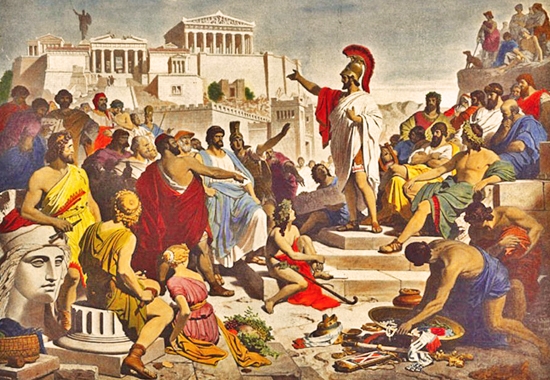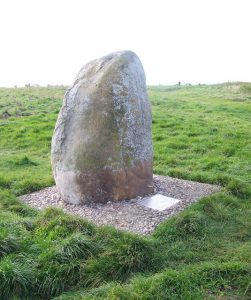Sunshine rained down on the rocky terrain of Athens. The wind’s cool breeze blew through the leaves of the olive trees and the world seemed blissful, as if humanity’s forever remaining conflicts did not exist. This moment of serenity only served as the backdrop to a story that seemed to be just the opposite. This drama became the stuff of history, rich in its effects on both its contemporaries and posterity. It is the tale of Pericles and the world that he impacted.
A society’s success and culture is synonymous with the individuals that inhabit it. In the fifth century BCE, the Greek city-state of Athens was governed by way of democracy. This democratic rule, however, was more directly self-ruled and founded on the idea that only qualified citizens (generally land-owning free adult males of Athenian birth) could participate.1 This form of leadership was far from perfect and lacked proper guidance. The political scene was dominated by those who had the most influence through wealth and power, and they often got their way. Also, the population was too easily swayed by the callings of a persuasive speaker, which is why Athens was in need of an honest, morally driven man to guide it.2 Society, as we know, struggles with possessing the knowledge and rationale that is required to run a government efficiently, so it’s important to have a suitable leader for the job.
Pericles was well-versed in the subjects of morality, ethics, and politics. His father, Xanthippus, and his mother, Agariste, were sure to envelope him within a controversial, influencing lineage, as their family name, Alcmaeonid, was rumored to be cursed.3 Expectedly, this gave Pericles difficulty in proving his worth, so he had to validate the claim that he could contribute to society. Power, policy, and ideology would need to be at the forefront of his actions, if he would ever want to be seen as a great leader.
Greek military status is of high regard within the minds of the citizens who are protected by its might. Cimon, a statesman and general for Athens, was a stepping stone for Pericles to achieve great influence and credibility to effectively guide Athens, its citizens, and his colleagues to success. Pericles attempted to prosecute Cimon on accusations of treachery by way of bribing his opponents, but Cimon was acquitted of his crimes, most likely due to his great political influence. This loss would not affect Pericles’s rise to power, as rumors of treachery and a decline of aid and trust by Spartan Army, who were at the time dealing with a revolt by a population of Helots (status between slave and citizen) they controlled and needed assistance, ensured that Cimon would lose his position as Strategus (a highly regarded official that usually was involved in foreign affairs).4 Pericles was now able to be unchallenged in his quest to increase his resume of acts and policies that would increase his popularity with the citizens. With the growing popularity he acquired, Pericles was voted into the forefront of democratic officials where his influence increased and by offering payment for participation in the jury system, he was able to increase the amount of individuals that were able to support him. From controlling revolting barbarians to rebuilding famous temples that would serve as economic boomers, his reputation as incorruptible and intelligent served as reasons to become elected as the new leader of the Athenian democracy.3 As the democratic leader, Pericles was elected into power by way of authority and military prowess, which many can argue is against democratic principles. He would then supervise the randomly selected officials (a choice of operation established before Pericles’s time) and make sure they behaved in a manner that he felt was best for Athens.

Pericles used his newfound influence to uphold his personal vision of what democracy is. In the time of the Peloponnesian War, he remarked what his true vision of what Athenian democracy was during a funeral speech given to the citizens mourning the lives that were lost to the Spartan Army. “Its administration favors the many instead of the few; this is why it is called a democracy. If we look to the laws, they afford equal justice to all in their private differences; if no social standing, advancement in public life falls to reputation for capacity, class considerations not being allowed to interfere with merit; nor again does poverty bar the way, if a man is able to serve the state, he is not hindered by the obscurity of his condition.”6 Pericles declared that the basic foundation of democracy was equality before law as a way to show Athens’s superiority to its contemporaries. He used the basic features of democratic accountability (monitoring, justification, and enforcement) to swiftly and justly lead the citizens that desperately needed proper guidance in a time of crisis, such as in war times.7 Using his political and military prowess, he led the city-state of Athens into its golden age of success and prosperity. Naval strategy against Sparta, cultural innovations with art (the Parthenon), improvements to the Athenian jury system, his determination and prestige would give him much sway in the direction of the future of Athens. His accomplishments in successful military victories, establishment of constitutional democratic rulings, and an overall sense of belonging created a new era in Greek History.8
With Pericles’s eventual death from a plague, Athens, the mother of democracy, would soon fall victim to the loss of the one-of-a-kind mind that had effectively led Athens into a period of prosperity and culture. Pericles will be regarded as a man of great intellect and influence within a country that is seen as a library of culture, thought, and historic value, forever cementing his place in the minds of historians for generations to come.
- Johann P. Arnason, The Greek polis and the invention of democracy: a politico-cultural transformation and its interpretations (Chichester: Wiley-Blackwell, 2013), 67. ↵
- Ancient History Encyclopedia, March 2013, s.v. “Greek Government,” by Mark Cartwright. ↵
- Encyclopedia Britannica, April 2017, s.v. “Pericles,” by David Malcom Lewis. ↵
- Ancient History Encyclopedia, April 2016, s.v. “Cimon,” by Mark Cartwright. ↵
- Encyclopedia Britannica, April 2017, s.v. “Pericles,” by David Malcom Lewis. ↵
- Fordham University Ancient History Sourcebook, August 2000, s.v. “Thucydides: Pericles’ Funeral Oration from the Peloponnesian War.” ↵
- Constantine P. Danopoulos, “Accountability and the Quality of Democracy in Greece,” Mediterranean Quarterly 26, no. 4 (2015): 112. ↵
- Encyclopedia Britannica, April 2017, s.v. “Pericles,” by David Malcom Lewis. ↵



23 comments
Antonio Coffee
Pericles was a great leader and was crucial to the success of Athens. He ensured that the city ran smoothly and he made sure that everything was going right with democracy. He was easily one of the largest defenders of democracy and he made sure that those helping to run the city were doing so properly. When Athens lost him it signaled a decline for the great city-state.
Fatima Navarro
Pericles paved the way for the future democracies in the world. Even after his death, Pericles was and is remembered for creating a strong and balanced Athens with its military and political affairs. I find this story nice because it told me a new story of history, something which I did not know. I like reading articles that informed me well and at the same time entertain me.
Diego Terrazas
Pericle seems to have been the personified epitome of democracy in Athens. Pericle really paved the way and portrayed what a real democracy should be like and what a leader should look like. This is a perfect example of democratic equality, where the citizen choose who they see best fit in control. It was a much informative article about an influential figure who pertains his influence to this day.
Marina Castro
Very interesting! The ancient Greek culture and history is always so interesting to read about. In high school and in current courses we have learned about Pericles and the early beginnings of democracy. This article was a great source of aid for me to amplify my knowledge on the subject. Also, the article was beautifully written and the author did a great job with the research!
Esperanza Rojas
I loved the beginning, which it starts of more like a fairy tale story than a regular informative article. This was extremely well written, in that, the author used the Greek vocabulary and in parenthesis, explained the definition. The story itself, was interesting. It is a prime example of how in a democratic society, one man can rise above his parents reputation and status.
Hector Garcia
I remember reading of Pericles and his conquests during the Peloponnesian War. This man was able to favor the many rather than the few. This is really interesting because, in this era, the aristocrats were the ones who hold most of the power in Greece. I was impressed by the number of achievements Pericles made during his lifetime. Overall, I thought this article was interesting and unique.
Bryan Martin Patino
Ernie, the content choice of your article is very well-thought out and deliberately chosen. Superb diction, story telling, and factually accurate information are all present. I can tell that you used your time and skills to construct a pleasing narrative that portrays history in a realistic, interesting manner. Your descriptive style of writing envelopes the reader’s senses and minds with not just a story, but a picture that will enthrall those with a sweet tooth for Greek history!
Alexandria Martinez
This was a good article that told the story of Pericles, a name that I had heard very little of before reading this. He seems like he was a very good leader, just the one that Athens needed. He brought it to a higher standing because of his political and military skills. It is a shame that once he died, Athens was unable to keep the same status without him.
Erik Shannon
This was a very well written article. This helped me understand the topic along with learning about this in class. I never knew that Pericles had a difficult time proving himself and his worth. His family was supposedly “cursed”, but he still was able to overcome both of these hardships. He led Athens as a great leader. Overall, this was a very well written article.
Osman Rodriguez
I’ve never read up or look for information on Pericles. So, I came into reading this article with no knowledge of him whatsoever. This is a great article, with a substantial amount of information. I feel as though I learned a good amount of what Pericles did to shape democracy in Athens. I enjoy reading about great leaders and seems Pericles is one I still have more to learn about. This article introduces readers to Pericles in a good manner.